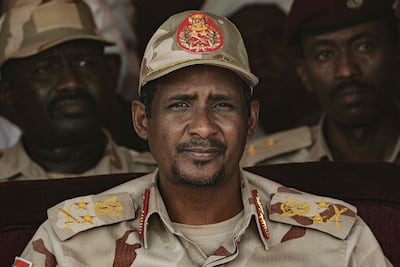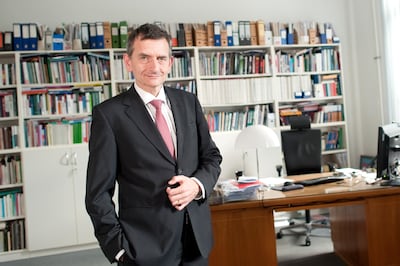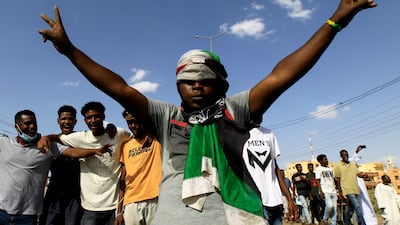Thousands rallied in Sudan’s capital on Friday to protest against military rule and demand a return to democratic transition a day after the country’s army chief appointed himself head of state more than two weeks after he seized power.
The largest protest was in Umm Durman, one of Khartoum’s three boroughs and a hotbed of dissent. Several thousand rallied there after Friday prayers, chanting “no to military coups” and “our government will be civilian”.
Smaller rallies were held in other Khartoum districts, including Burri and Gabrah.
The relatively small protests on Friday come a day before hundreds of thousands were expected to participate in rallies against the military takeover called for by the powerful Sudanese Professionals’ Association and neighbourhood resistance committees.
Saturday’s rallies are to be held under the slogan “no negotiations! no bargaining! and no partnership!”. The slogan mirrors the SPA’s resolution that the country’s pro-democracy movement wants to see the military excluded from any future government. It is also calling for army chief and coup leader Gen Abdel Fattah Al Burhan to be put on trial with his associates for upending the transition.
Calls for Saturday’s rallies have significantly intensified since Gen Al Burhan named himself the country’s leader on Thursday night, with organisers bypassing the 18-day internet blackout by using SMS messages, word of mouth, graffiti and flyers to mobilise.
State television said local authorities in Khartoum will close all but three Nile bridges in the city at midnight in anticipation of Saturday's rallies. The closure, as in past cases, is designed to prevent protesters from gathering in one place where they can easily overpower security forces.
“The situation now is one of open confrontation between the military and the people, with each side going into its trenches and preparing to use all weapons available,” said political analyst Osman Al Mirghani, also editor in chief of the Khartoum daily Al Tayaar. “They are on two completely separate roads and are unlikely to meet.”
Gen Al Burhan was sworn in on Thursday night as the country’s de facto leader after naming himself chairman of a 14-seat transitional council to rule the country until elections he announced for July 2023.
The new Sovereign Council now includes civilians representing Sudan's various regions, replacing representatives of the Forces of Freedom and Change, a pro-democracy alliance that led an uprising against dictator Omar Al Bashir before going on to become the political patron and power base of a civilian-led government that Gen Al Burhan dismissed when he announced his October 25 coup.
Gen Mohamed Dagalo, commander of the powerful paramilitary Rapid Support Forces, retained his post in the council as deputy chairman, keeping what is widely seen as an uneasy alliance between two men vying for supremacy in post-Al Bashir Sudan.
The SPA described the new council as illegitimate in a statement late on Thursday night and would only be met with “popular contempt and resistance”. It said it wanted Saturday’s rallies to be a “popular earthquake and a revolutionary tidal wave”.
Besides derailing Sudan’s democratic transition, Gen Al Burhan has also declared an indefinite state of emergency and detained Prime Minister Abdalla Hamdok with several Cabinet members. He also suspended a state commission mandated to dismantle the legacy of Al Bashir.
In the weeks since the coup, he ordered the arrest of scores of critics, including activists, journalists, union leaders and prominent members of neighbourhood resistance committees.

The coup has been met with near daily street protests, including one on October 30 in which hundreds of thousands took to the streets across Sudan to demand that the military step aside and the country’s democratic transition be put back on track. At least 12 protesters have been killed and some 300 wounded since the coup. Gen Al Burhan denies the involvement of the army in the killings, but activists say most of the killed and injured suffered gunshot wounds.
International opposition to the coup was just as strong, with the United States and the World Bank suspending hundreds of millions in aid and the United Nations demanding a return to the transition process.
But Gen Al Burhan insists that the military takeover was not a coup and was in fact a “correction” of the transition track. He said it was in response to public insults of the armed forces by civilian politicians and activists, incitement of sedition and the poor handling of the economy by Mr Hamdok’s government.
His self-appointment as Sudan’s leader has in the meantime dealt a body blow to already stalling mediation efforts to find a way out of the country’s crisis.

The United Nations, whose chief representative in Sudan has led a mediation attempt, said it was very concerned by Thursday’s developments.
In a closed-door briefing to the UN Security Council, UN Sudan envoy Volker Perthes had been "very frank in his assessment that the window now is closing for dialogue and for peaceful resolution" Britain's UN ambassador Barbara Woodward said.
In a separate development, the United States, Britain and the European Union slammed Gen Al Burhan's latest move on Friday.
"This unilateral action by the military undermines its commitment to uphold the agreed transitional framework," they said, referring to a power-sharing deal reached in August 2019 between the military and the pro-democracy movement for a transitional period. The statement was also signed by Norway and Switzerland.
"We urge an immediate and full return to this (democratic transition) path to ensure that the hard won political and economic gains of the last two years are not lost."













